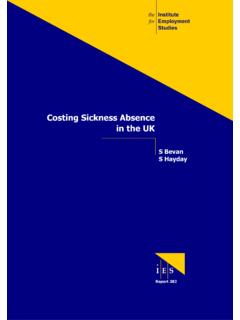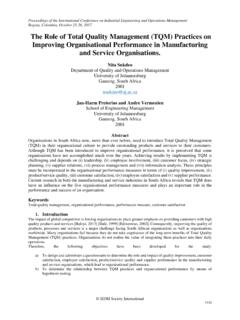Transcription of Organisational Justice - Institute for Employment Studies
1 Organisational Justice Susanna Baldwin Published by: Institute FOR Employment Studies Mantell Building University of Sussex Campus Falmer Brighton BN1 9RF UK Tel. + 44 (0) 1273 686751 Fax + 44 (0) 1273 690430 Copyright 2006 Institute for Employment Studies No part of this publication may be reproduced or used in any form by any means graphic, electronic or mechanical including photocopying, recording, taping or information storage or retrieval systems without prior permission in writing from the Institute for Employment Studies . The Institute for Employment Studies The Institute for Employment Studies is an independent, apolitical, international centre of research and consultancy in human resource issues.
2 It works closely with employers in the manufacturing, service and public sectors, government departments, agencies, and professional and employee bodies. For over 35 years the Institute has been a focus of knowledge and practical experience in Employment and training policy, the operation of labour markets and human resource planning and development. IES is a not for profit organisation which has over 60 multidisciplinary staff and international associates. IES expertise is available to all organisations through research, consultancy, publications and the Internet. IES aims to help bring about sustainable improvements in Employment policy and human resource management.
3 IES achieves this by increasing the understanding and improving the practice of key decision makers in policy bodies and employing organisations. The IES HR Network This report is the product of a study supported by the IES HR Network, through which Members finance, and often participate in, applied research on Employment issues. Full information on Membership is available from IES on request, or at Organisational Justice 1 Organisational Justice Introduction The term Organisational Justice refers to the extent to which employees perceive workplace procedures, interactions and outcomes to be fair in nature.
4 These perceptions can influence attitudes and behaviour for good or ill, in turn having a positive or negative impact on employee performance and the organisation s success. The concept of Organisational Justice extends traditional models of work behaviour that tend to conceptualise job demands, job control and social support as the main factors determining individual well being and productivity. Fairness is a largely subjective construct, which captures more basic elements of the social structure in which these other characteristics operate. Often the notion of Organisational Justice will only become relevant and tangible when a violation of said Justice occurs.
5 Examples of perceived injustices within an organisation might include: unequal pay for men and women doing the same job performance reviews being conducted by someone with whom the employee has had little previous contact the use of personality inventories to select new staff arbitrary dismissals. Work psychologists have highlighted three distinct, though overlapping, types of Organisational Justice : distributive, procedural, and interactional. Each will be briefly described below, and their implications for HR practice examined. Distributive Justice This type of Justice refers to outcomes being distributed proportional to inputs the so called equity principle (Adams, 1965).
6 Outcomes in a work context might take the form of wages, social approval, job security, promotion and career opportunities, while inputs would include education, training, experience and effort. As it can be difficult to determine what constitutes an appropriate level of reward for a particular degree of input, people tend to make this judgement in relative terms, looking for a contribution outcome ratio that is similar to that of their peers. The equity principle is already upheld in organisations to a large extent by standardised HR policies, such as predetermined job grades and salary bands, universal training and development opportunities, and avoidance of favouritism in showing approval.
7 However, there may come occasions where an employee feels there has been an unfair distribution of benefits; for example, a colleague with the 2006 Institute for Employment Studies 2same number of years service is promoted while the individual concerned is not. Clearly such decisions by management are likely to be based on considerations other than tenure alone, but these will not always be transparent to outside observers. The unpromoted employee may consider that his inputs were the same as his colleague s and yet they have been rewarded differently. Consequently, they may seek to redress this perceived inequity either by reducing their subsequent efforts, or by campaigning to be recompensed to the same degree as their colleague.
8 Either course of action is likely to be damaging or, at best, inconvenient to their employers. The notion of equity may sometimes be overruled by that of equality (everyone receives the same) or need (people receive according to their personal circumstances), especially when the outcome is something that cannot strictly be earned, such as medical insurance benefits. Research has shown some cross cultural variation in the preferred basis for outcome distribution, with Americans favouring the principle of equity, Indians of need, and Dutch of equality (Storey, 2000); but as will be seen below, the final allocation of rewards may not be so intrinsically important as the process by which the allocation was decided.
9 Procedural Justice Procedural Justice is concerned with the fairness of the decision process leading to a particular outcome. As just noted, procedural Justice can outweigh distributive Justice , in that people may be willing to accept an unwanted outcome if they believe the decision process leading up to it was conducted according to Organisational Justice principles. For example, Greenberg (1994) found that smokers more strongly accepted a smoking ban at their workplace when they felt they had been given thorough information about the change of policy, in a socially sensitive manner (see Internet Resources for more information on implementing a workplace smoking ban).
10 The same principles might apply to the hypothetical promotion scenario given above. An unpromoted worker may be placated if he is convinced that the system used to decide promotions is transparent and free from bias. Voice principle People s perceptions of procedural Justice are likely to be enhanced if they are given the opportunity to present information and voice their concerns before decisions are taken. This can apply as much to general day to day working life and management practice as to formal, one off procedures such as disciplinary hearings. Psychologists have argued that having a voice helps to fulfil particular needs such as the chance to be heard and to influence other people, as well as the confirmation of being valued as a participative group member (Storey, 2000).










